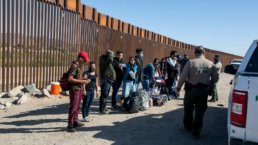Where will the world find refuge in 2024?
by Rebecca Gordon, Tom Dispatch
Back in 1968, my father announced that, if Richard Nixon were elected president that November, he was going to move us all to Canada. I’m not sure who “us all” actually was, since my younger brother and I were then living with my mother and my parents had been divorced for years. Still, he was determined to protect us, should someone he considered a dangerous anti-Semite make it into the Oval Office — and leaving the country seemed to him like the best way to do it.
As it happened, Nixon did win in 1968 and none of us moved to Canada. Still, I suspect my father’s confidence that, if things got too bad here, we could always head somewhere else (Canada? Israel?) was a mental refuge for him that fit his own background very well. It was, after all, what his father had done in 1910, when his family was attacked by Cossacks in what’s Ukraine today. His parents had him smuggled out of town in a horse-drawn rig under bales of hay. He then walked across a significant part of Europe and took a boat from Antwerp, Belgium, to New York City. There, he was met by a cousin who brought him to Norfolk, Virginia. Eventually, my grandfather managed to bring his whole family to Norfolk, where he became, among other things, the president of his local Zionist club, fostering his dream of refuge. My father grew up in the haze of that dream.

In fact, my father’s reliance on the guarantee that he could go “somewhere else” accorded well with the post-World War II international consensus that people in danger of persecution where they lived had a right to seek refuge in another country. Shortly after the formation of the United Nations, that view was codified in the 1951 Convention Relating to the Status of Refugees.
The Convention consolidated various treaties created by European nations to address the desperate situation of millions of people displaced by the two World Wars. It defined a refugee as a person who:
“As a result of events occurring before 1 January 1951 and owing to well-founded fear of being persecuted for reasons of race, religion, nationality, membership of a particular social group or political opinion, is outside the country of his nationality and is unable or, owing to such fear, is unwilling to avail himself of the protection of that country; or who, not having a nationality and being outside the country of his former habitual residence as a result of such events, is unable or, owing to such fear, is unwilling to return to it.”
Recent Posts
‘Unconstitutional. Unethical. Authoritarian.’ ICE Bars Millions Of Immigrants From Bond Hearings
July 18, 2025
Take Action Now One watchdog said the new policy “seems like a blatant attempt to stop them from exercising their right to due process.”……
Americans Are Not Nearly Alarmed Enough About Climate Change
July 18, 2025
Take Action Now Americans still don’t comprehend how imminent, dangerous, and far-reaching the threat is—and journalists are partly to blame.By…
The IRS Is Building A Vast System To Share Millions Of Taxpayers’ Data With ICE
July 17, 2025
Take Action Now ProPublica has obtained the blueprint for the Trump administration’s unprecedented plan to turn over IRS records to Homeland Security…
Israel’s Sudden Assault On Syria Is Unchecked Aggression
July 17, 2025
Take Action Now Jerusalem is bombing Damascus and threatening al-Sharaa’s rule, while Washington was hoping to help the nascent government on…




